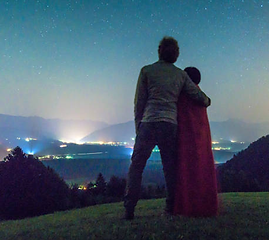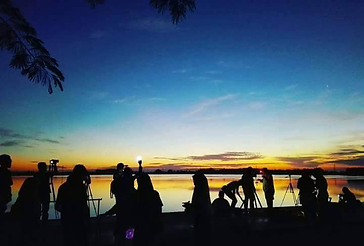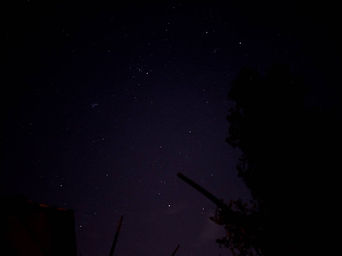
Winning Entries of the IAU100 Short Story Contest
Under One Sky
This category comprises stories showing the potential of astronomy to bring people together.
Credit: Vistapro Landscape Imagery, Rendered by Jeff Bryant
1st: María Alejandra Díaz Teodori, Spain - “New Beginnings”
It was a day of goodbyes. To the friends who hadn't left yet, to the L-30 city-pyramid, to landscapes of artificial clouds with the Sun—red and regal—covering half the sky.
Now, as Nan looked at the firmament, she also bid it farewell. The stars glittered like the scales of some ancient, gargantuan creature. Which one would be her new home? The thought stung. The last colony on Earth, gone.
Suddenly, she felt footsteps. Her father appeared. "Can’t sleep?"
She nodded. He sat next to her.
"We'll be alright."
"Will we be humans anymore?" He considered his words.
"Are we humans now? Our ancestors would doubt it. But we're here star gazing, like they did. In fact, we have a future because they looked up and wondered. And humans will keep doing that, wherever they are.”
"That's...comforting. Thanks."
Father and daughter stayed there, savoring their last night on Earth.
Credit: Islamic Astronomy University of Malaya Album
2nd: Nurul Husna Mohammad Bokhari, Malaysia - “Two Minutes of Amazement”
I heaved a sigh of relief, heart pounding, and short breaths in between. Only a few minutes left before the
total solar eclipse starts, my instruments finally working after several unexpected breakdowns.
“Three, two, one! Totality!”. Sudden silence fills the air. Bright daylight gradually turned into dusk. Whispers of praises to the Almighty murmured. Tears of joy began rolling down my cheeks. A year of preparation
overtaken by this two minutes of breathtaking phenomenon. Gazing along the Jakabaring Lake, I smiled
feeling the ambiance of astronomy lovers in the air. More than a hundred amateur astronomers,
professionals, astrophotographers and astronomy enthusiasts around the world gathered in one place.
Simply because the amazement of the celestial bodies, curious thinker or just enjoying the nature. From
different backgrounds, all under the same sky, sharing our passion with a vision to spread about this
wonderful and exciting cosmos with others throughout the world.
Credit: Benjamin Van Der Spek
3rd: Alexis Eder Rodríguez Quiroz, Peru - “The Destiny was in the Sky”
When Killa and her father returned from working in the fields at night, one question worried her. Why do we have to plant at this time?
He smiled and pointed to a tiny bluish glow to tell her one of his ancestral knowledge. He called it Qoto in quechua: If the stars are clear, it will be a good weather, otherwise; it would be bad. But she wanted to know more.
The next day, Killa went to the computer lab, looked for Qoto and discovered that its real name was Pleiades and that is star cluster located 450 light years away, read its history, Killa was amazed and when she saw the images, she cried.
She discovered the Inca’s constellations and her name in Spanish is Moon. Then, during dinner she told her family: "I want to be an astronomer, I like astronomy", Her family embraced her willing to support.
Credit: Kimberly Patterson
4th: Cameron A. Mitchell, United States of America - “Amateur Astronomy”
2:34 am
Usually, sleep has claimed me by now, drowning melancholy thoughts with dreams of home. Not now. Now I lie here, staring out at a foreign skyline and distant moon. I think about how empty and cold my bed is. Usually there’s the warmth of a person at my back, a weight, a presence.
I roll to my other side, cold light at my back.
This amateur astronomy is making me sick at heart.
11:00 am
I stare mindlessly at my screen. I wonder about lunch, about dinner. I remember the moon and my cold bed. I think of home. Does she miss my warmth at her back as much as I miss her’s?
My phone buzzes beside me. A photo of the moon glows up at me. A short sentence accompanies it: We may not be together, but the moon is with us both.
I smile.
Cocoa sundried in the patio of a town called Chuao. Credit: Madeleine Rodriguez
5th: Marie Madeleine Rodriguez Sanchez, Venezuela - “Euphony”
Once a year the plush smell of cocoa delicacies fills the air. In the small colonial main square, the faithful play different kinds of drums while singing and praising until dawn. As had happened before to others I too was moved, in this ephemeral centre of the Cosmos.
All have gathered and gaze towards the Southern Cross constellation shining brightly, to welcome the rain season in this tropical isolated community surrounded by rainforests and the warm sea. This 450 year old tradition is a colourful plight for abundance in land, sea and river, and the coming together despite differences of the indigenous Caribe tribe’s mysticism, the african’s workforce resilience and the european naturalist’s modern science.
And in this great encounter amidst the unplugged night sky, wilderness, fruit, fish, flowers, stories and spirits you catch a glimpse of humanity’s true melody driven by heterogeneity and the vastness of the universe.
Inspiring Stars
This category comprises stories showing the important role that astronomy could play for inclusion, equity and diversity.
Little Zazil-Há in the jungle imaging the ancient Mayan night sky with the Kukulcan deity, the feathered serpent, on it. She is wearing a “Huipil” which is the typical modern Mayan dress. In the background are a Mayan pyramid and the Sacred Ceiba tree. In the Mayan cosmology the canopy of this tree represents the sky. Credit: Sac Nicte X. S. Medina
1st: Sac Nicté Medina, Mexico - “Kaxan Eek'oobo' – The Hunter of Stars”
At her seven years old, Zazil-Há only spoke the Mayan language. The economic difficulties of her family could not guarantee for her a good future, but her innocence let her dreamed about it without limits.
Her major passion was to observe the night sky. Her grandfather called her Kaxan Eek’oobo’ (the hunter of stars). He did not know how to read, but he filled Zazil-Há’s imagination with marvelous stories from their Mayan people about the stars. Zazil-Há wondered how did look like the night sky that the Itza, the ancient Mayans, used to study and how was possible for them to understand the stars.
Those nostalgic moments from her childhood exploded like a supernova into her head one night while she was typing commands of observation in a computer. She smiled and thought: The future is not written in the stars, but follow them let us find a great one.
Credit: Alisa Latifatul M
2nd: Alisa Latifatul Munawaroh, Indonesia - “Supernova”
Son : Dad, what makes you love the universe so much?
Dad : The universe is vast, many incredible things can happen out there. Do you know, Son? The more we study the universe, the more we know that we are nothing.
Son : Then, If you were one of the universe’s object, what do you want to be?
Dad : I want to be an exploding star or what we often know as a supernova.
Son : A supernova? Doesn’t it mean your lifetime has ended, Dad?
Dad : It’s a happy thing that we can be a bright light that impact life with the knowledge that we own. The noblest people are those who can be useful, right? If my life has ended, at least I shine before I die.
Son : But still dad…
Dad : Son, if a star explodes, won’t new stars be born afterwards?
Credit: João Francisco Ferreira
3rd: Yolanda Bezerra de Andrade, Mexico - “My Life Under a Starry Sky”
As a child, as the Earth spins, I lift my eyes to the sky and stand for hours looking at the stars in search of the star with the greatest brightness. Maybe because of my mother's influence - she encouraged me to understand them. Maybe because it's the only way I can get close to them.
Now, well afterwards, it occurred to me with some unpleasant anxiety that I know nothing about them. And I was overwhelmed by a secret and unusual eagerness to know a little about them. So I decided that I would devote part of my life to reading books and magazines to answer a lot of questions.
That is my idea and my hope. Anyway, I have a vast universe to go through and the life to do it.
Credit: Alessandro Falesiedi
4th: Paula Manuela Leguizamon-Pineda, Colombia - “Nothing but Stardust”
An explosion gives rise to a complex universe of elements getting themselves together to form stars and structures like planets. Cycle is repeated and the remains of those dead celestial bodies become seed for those new. Among them, on the Earth microorganisms, plants, human beings emerge.
Therefore, if we look closely at the elements that compose living beings we may find we all are a set of elements produced by stars during their lifetime, like the oxygen we breath and the carbon being common to all living forms, creating life through complex chains like DNA.
Being able to understand that, is thus one of the wonders Astronomy may offer. Besides of showing us our place in universe, it teaches us a humility lesson: no matter our shape or colour we all are made the same and definitely, recalling what that noted scientist once said, we all are nothing but stardust.
5th: Naman Sushil Baja, India - “Something New, Something Different”
When I was first introduced to astronomy, different constellations and the Greek mythologies surrounding them were made known to me. I could not wrap my head around those theories and was not able to remember any constellation. I thought of making this process of learning fun & easy and hence, I started making my own mythologies. In my mythology, Orion is the name of a 'Ready to launch' rocket which is being monitored by a group of people (which are a part of 'Pleiades' organization) through a prismoscope called 'Taurus'. Orion's shield (in Greek mythology) can be considered as the boundary of 'no entry' zone during launch.
I find this an interesting way to learn a part of astronomy. It can be followed by a person of any age, profession, gender, etc. I think it's fun, requires no particular background (equal to all) and gives rise to such diverse thoughts.










